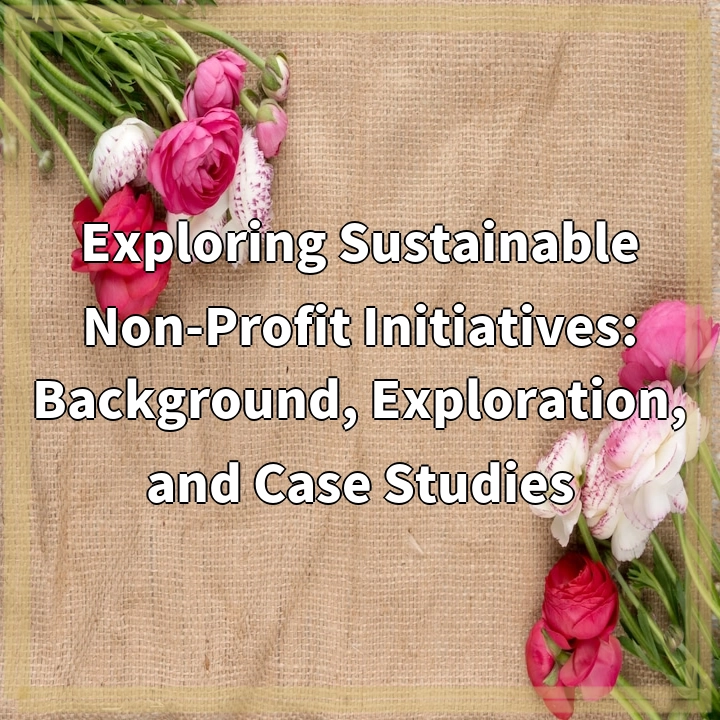
What are Sustainable Non-Profit Initiatives?
Sustainable non-profit initiatives refer to projects or organizations that are dedicated to addressing social and environmental challenges while operating in a financially sustainable manner. These initiatives strive to make a positive impact on society without solely relying on grants or donations.
Real-World Problems Associated with Sustainable Non-Profit Initiatives
While sustainable non-profit initiatives are driven by noble intentions, they often face various challenges in their pursuit of long-term impact. Some of the real-world problems associated with these initiatives include:
1. Financial Sustainability:
Sustainable non-profit initiatives must find innovative ways to generate revenue and cover their operational costs. Relying solely on donations may prove insufficient, making it crucial to develop sustainable funding models that ensure the longevity of the organization.
2. Resource Management:
Efficiently managing limited resources is another significant challenge for these initiatives. As they strive to create a positive impact, they need to carefully allocate and utilize their resources, including funds, human capital, and materials, to maximize their impact and ensure long-term viability.
3. Scaling Up Impact:
Many sustainable non-profit initiatives face difficulties when scaling up their impact. While they may start with small pilot projects or local initiatives, expanding to a larger scale often requires additional resources, partnerships, and strategic planning to overcome logistical and operational challenges.
4. Collaboration and Partnerships:
Collaboration is vital for the success of sustainable non-profit initiatives. Building partnerships with like-minded organizations, governments, businesses, and local communities is necessary to pool resources, share knowledge, and work together towards common goals. However, finding and establishing these partnerships can be challenging, requiring effective networking and relationship-building skills.
5. Measuring Impact:
Effectively measuring impact is crucial to demonstrate the success and effectiveness of sustainable non-profit initiatives. This involves developing robust monitoring and evaluation systems that can accurately capture the social, environmental, and economic outcomes of their work. However, measuring intangible impacts and ensuring data accuracy can be complex and resource-intensive.
6. Policy and Regulatory Environment:
The policy and regulatory environment can significantly impact the work of sustainable non-profit initiatives. Navigating complex regulations, obtaining necessary permits, and complying with legal requirements can pose challenges, especially when operating in multiple jurisdictions with varying policies.
Despite these challenges, sustainable non-profit initiatives play a vital role in addressing social and environmental issues. By recognizing and addressing these problems, these initiatives can enhance their effectiveness and contribute to creating a more sustainable and equitable future.

Solutions to Real-World Problems of Sustainable Non-Profit Initiatives
1. Financial Sustainability:
To address the challenge of financial sustainability, sustainable non-profit initiatives can explore revenue diversification strategies. This can include generating income through social enterprises, building partnerships with businesses, and implementing innovative fundraising campaigns. By exploring various funding sources, these initiatives can better ensure their long-term financial stability.
2. Resource Management:
Efficient resource management is key for sustainable non-profit initiatives. By implementing effective monitoring and evaluation systems, organizations can identify areas of inefficiency and make necessary adjustments. Collaboration and knowledge sharing with other organizations can also help optimize resource utilization and reduce wastage.
3. Scaling Up Impact:
To scale up their impact, sustainable non-profit initiatives can seek strategic partnerships and collaborations. Forming alliances with government agencies, local communities, and other organizations can provide access to additional resources, expertise, and networks. Careful planning and prioritization are essential to ensure successful expansion.
4. Collaboration and Partnerships:
Building strong and meaningful partnerships requires effective communication and relationship-building. Sustainable non-profit initiatives can actively network with stakeholders by attending conferences, participating in industry events, and joining relevant professional networks. Developing shared goals and clear communication channels can enhance collaboration and maximize impact.
5. Measuring Impact:
To effectively measure impact, sustainable non-profit initiatives can invest in robust monitoring and evaluation systems. This can include collecting quantitative and qualitative data, utilizing impact assessment tools, and involving external evaluators for objective analysis. Clear indicators and benchmarks can help track progress and demonstrate the effectiveness of the initiatives.
6. Policy and Regulatory Environment:
Navigating the policy and regulatory environment requires staying informed and actively engaging with relevant stakeholders. Sustainable non-profit initiatives can advocate for favorable policies, build relationships with government officials, and actively participate in policy discussions. Engaging legal counsel and compliance experts can also ensure adherence to regulations across different jurisdictions.
By implementing these solutions, sustainable non-profit initiatives can overcome challenges, improve their effectiveness, and make a greater positive impact on social and environmental issues.















